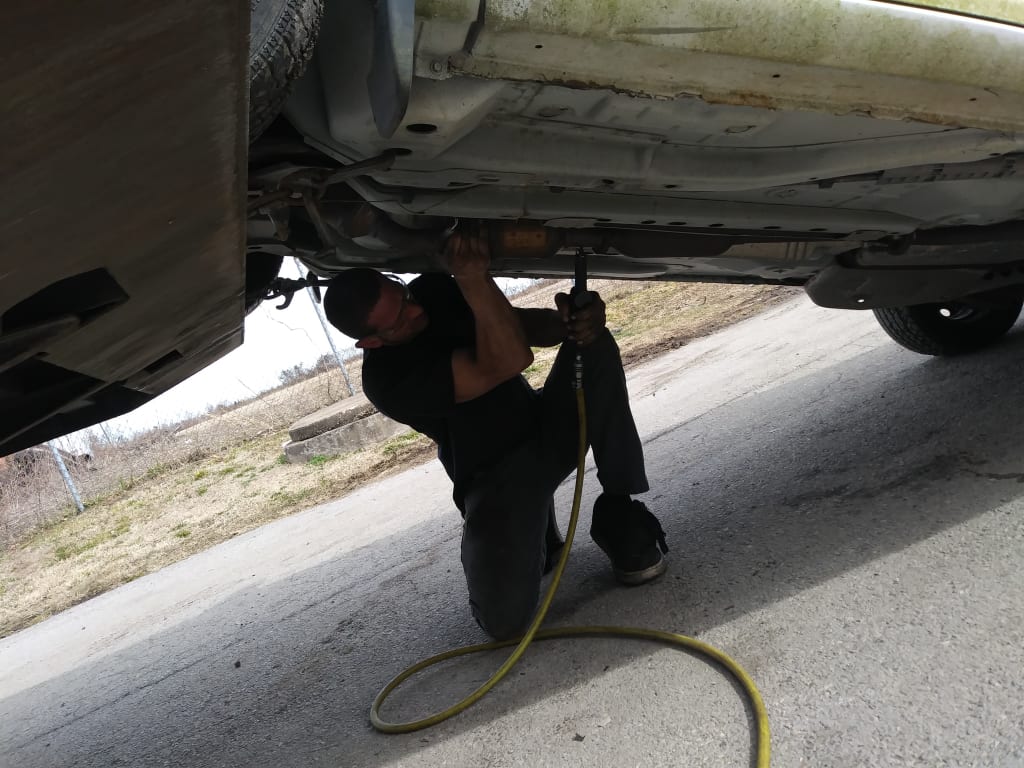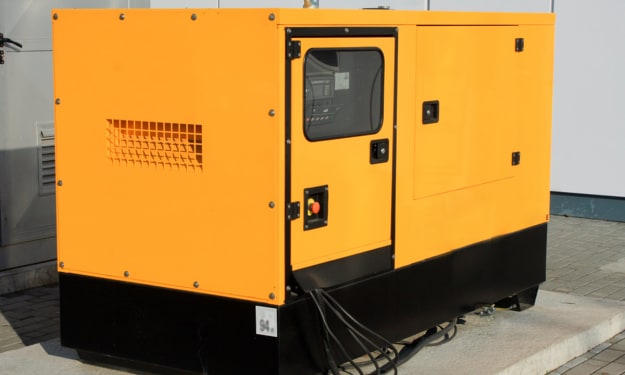Your Vehicle's Extended Warranty
I Wish I Would Have Read the Contract

Who doesn't get a call about their vehicle's “Extended Warranty”? I know I get approximately 2-4 calls per day regarding a vehicle I don't even own. It drives me absolutely bonkers. No matter how many I block or the fact that I don't have a vehicle in my name, the calls come reeling in daily.
But have you ever bought a car and opted into the purchase of an extended warranty? Whether it be a new or used car that you have purchased or are planning on purchasing, there are a few bits of useful information that you should know. We will call them the “I wish I had read the contract” bits.
The first bit you need to be aware of is the fact that if you are purchasing a warranty from the dealership, but the contract is through another company, you still bought the contract from the dealership! That is because most of the companies that sell extended warranty contracts don't sell to individuals. They sell to vendors or other companies, such as new and used car lots. At that point, it's a commercial or wholesale rate and can be resold at a retail price to an individual. That's how they are able to offer you a better rate once you decline the first time. So, say you purchase a 6 month contract for $699, and they came down from $899. The fact is, they probably only pay the warranty company $95-$150 for a contract of that length. It varies based on length and type of contract, also. Which brings me to the next bit.
The second bit entails a difference between Power Train, Comprehensive, and Comprehensive with ABS and/or Electrical Components. This is a big deal! Your Power Train components are limited to just that. So unless you need an engine or transmission completely REPLACED, don't even bother. And honestly, who plans on purchasing a vehicle that is going to require that either one of those be replaced in a 6 month period anyways, right? Who ever really knows? Does that mean opt-in for the Comprehensive or add-ons? Not necessarily. Your 6 months could be up faster than your actual 6 months, though, and that comes down to this bit.
It's normally a 6 month or so many thousands of miles. Right? How many miles does your 6 months add up to? If you know you are buying a lemon, and feel you may just need to go on and purchase that 6 month warranty, my suggestion would be to go somewhere else. Even if it's difficult to find financing, if you can wait, I would. If you are going to want an extended warranty and the car is new, it's probably because you are investing a large amount of money into something an you'd like to protect your investment down the road, say, after the vehicle's manufacturer's warranty has expired per mileage or length of time is not important. At that point, they make their buy for a 2 to 3 year contract. The other purpose one may have for an extended warranty on a new vehicle are the ones that these lower end and short term contracts are designed around. These are the individuals whom either, know they are rough on their vehicles or know absolutely nothing about the upkeep or maintenance on said vehicle. Those are the kinds of car buyers these short term contact agreements revolve around when the vehicle is new. It's to protect the lien holder normally and sometimes the buyer who's not required to be an automotive technician or professional upon purchase, just a driver. For USED vehicle purchases, I would suggest doing your homework FIRST!
This is why, you are most likely going to WANT to include the extended warranty with your upcoming purchase. Not because the dealerships associated with used vehicle sales are shoddy, because I know several of them that aren't, but you NEVER KNOW how someone else treated that vehicle prior to it ever arriving at the lot in which you are buying it from. As a mechanic, you access a vehicle to ensure it's current state is operable and no indicators are going off. Indicators that are obvious, such as a check engine or service light on the dash, or something obvious to a technician, like a hiss, whine, tick, knock, etc. Then they do their best to bring the vehicle up to par. Par being running condition, without an indication that their will be a need for another repair any time relatively soon and all lights are off and noises have ceased and remain to for the entirety of the post repair road test. That's the basic rundown. Of course there are technician's and repair shops that have a protocol of their own, but that's neither here nor their. But that brings us back to the necessary contract.
Each company that offers your vehicle a contract service agreement offers something different. They are not all the same basic insurance coverage and vary greatly to some degree or another. So, this bit is the most important factor if or when you decide to purchase a contract on your future investments. What is it that you want from your warranty company's contract? All inclusive, low price, lengthy term in way of mileage and age? Don't we all? But what about this: what's really going to cripple you the most if your vehicle breaks down on the side of the road in another state while you have your entire family their in the remaining seats? Are you going to wish you had roadside assistance, towing, rental car reimbursement, etc.? Can you even use your warranty in another state? And what is your state's law on coverage based on mileage? Is it the dealership's responsibility or the warranty company's obligation to cover you? How do you know? You don't have the darn contact on you. It's at home in your filing cabinet, safe and sound, with everything else you signed.
Do me a favor, always remember to keep your contract in your vehicle. Better yet, keep a copy of it in the glovebox and the original in the filing cabinet. Always read before you sign. Don't ask your salesman questions about it, that's not their job. They sell cars, not warranties. They listened to a pitch provided by the salesman from the warranty company and it sounded good. Do they remember it all? Probably not, and probably just the key factors, ie: how much they can profit off of each one. Don't be mad at them! They're salesman, that's how they make a living. Now, that being said, you should pay close attention to the:
1. Type of contact
2. Length of coverage – including mileage time range
3. Components covered – if the transmission is covered, but the solenoid isn't, your repair for a non-working tranny is NOT covered. Intake manifold repair only covered if intake is leaking coolant? Not if they have to get to another component? Because that's out of pocket for YOU! Go to your repair shop with the copy of your contract. Call your shop BEFORE you buy the contract and find out if they even do business with that warranty company. They MAY NOT!
4. MAXIMUM PAYOUT – if you have used your warranty previously, regardless whether you still have 8 months or 16,228 miles left before it expires, but the amount of money that the repair shop was paid for your last repair or all your repairs thus far has equaled to or exceeds the amount left on your Max Payout for your entire contract - the rest is out of your pocket. Also, if your Max Payout is $1800, you may want to reconsider paying $1500 for that extended 3 year warranty. The likelihood that your going to need it is irrelevant - at that cost - you are paying out of pocket anyways. So why go through the hassle of a third-party payee.
5. Filing A Claim - What is the protocol for filing a claim? I do NOT mean - Who do you call or what do you tell your mechanic once they're done with the repair and want to be paid. I'm referring to the fact that each company has an order they would like you to proceed with a claim. Your vehicle breaks down, do you call the local tow truck company and have them haul it to your trusted mechanic's repairf facility? Are you required to take it to an authorized repair facility through the warranty company for your diagnostic before you have the 'right' to choose your own repair shop? Can you even be reimbursed for a part that was repaired if the repair wasn't authorized by the warranty company prior?
Safe bet is to know BEFORE you purchase the contract.
6. Claim Policy and Payments Rendered or Reimbursed - How long does it take to have your vehicle repaired? OMG! Minimum is approximately 30 to 45 days for claim approval. Meanwhile, you are without transportation. You contract has rental reimbursement at what amount? $30/day for a max of 4 days and only if the repair flat rate hours (according to how long the job SHOULD take an ASE certified shop) is equal to or greater than what? 10 - 15 hours? Not how long they've had your car, but how long the job takes! And Towing reimbursement is based on a max allowance of $40-$75? But only if what? The car wasn't operable? But what if it was and you drove it to the shop after the light came on? Did that cause more damage? Is it now YOUR fault the entire engine needs to be replaced and your claim is denied? GET AUTHORIZATION to move your vehicle, if it's operable, from your warranty claim's department representative ONLY! And get their name!
7. Cancellation Policy - How does it work? When are you allowed to cancel, or ARE you allowed to cancel. What IF your vehicle was deemed a TOTAL LOSS by your car insurance or you no longer own the vehicle because it was a REPO? IF they agree to cancel or reimburse you for the contract, WHO pays you? The contract company? NO, not normally. Remember, you didn't buy it from them, did you?
Hello? You bought it from the dealership!
I know this all seems like way more than BITS of information you may need, but each individual has different needs when it comes to these warranties. Am I saying that buying an extended vehicle warranty is a bad idea? NO, definitely not what I am saying. I am NOT saying that you NEED one, either. I am strictly stating that you can seriously set yourself up for failure and disappointment if you are making a decision to protect an investment you made and aren't informed. Especially, when you are limited on resources during a time like these. Being a single parent, a disabled or retired individual on a fixed income, or whether you have a ton of bills and just can't afford a major repair right now, you want to be able to rely on your previous or future investment when purchasing an extended warranty.
I know, I do. If you choose to go that route, make sure you're aware of what your money is really doing for you!
About the Creator
Star Besio-Sharp
Something's can never be said out loud. Leaves room for argument and offense. Best if you just leave the reader to their own interpretation. No response or debate required. It's my story. So I can tell it. But after that, it's YOURS!






Comments
There are no comments for this story
Be the first to respond and start the conversation.